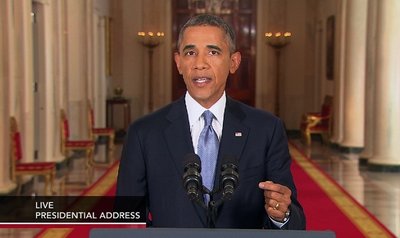President Barack Obama has been lobbying Congress and the American people to support a military strike against Syrian military targets as punishment for using chemical weapons, but in a speech Tuesday night, he announced that his administration would pursue one last diplomatic opportunity before taking action.

President Obama addresses the nation from the White House.
President Obama addresses the nation from the White House.
Syria’s friend, Russia, has offered to take control of Syria’s chemical weapons stock in exchange for the U.S. calling off its strike. Syrian President Bashar al Assad has signaled that he would be willing to take the deal, but the Obama administration is skeptical of the plan.
“It’s too early to tell whether this offer will succeed,” President Obama said. “And any agreement must verify that the Assad regime keeps its commitments. But this initiative has the potential to remove the threat of chemical weapons without the use of force, particularly because Russia is one of Assad’s strongest allies.”
Chemical weapons spark international debate
After United Nations inspectors
found evidence
that the chemical weapon known as sarin gas killed an estimated 1,400 people in the ongoing Syrian civil war, the U.S. and a small coalition of allies have been debating how to intervene in the conflict to send a signal that using such weapons is unacceptable.
U.S. Secretary of State John Kerry said evidence shows the Syrian government, controlled by President Bashar al-Assad, is behind the sarin attacks.
"We know that for three days before the attack, the Syrian regime’s chemical weapons personnel were on the ground in the area, making preparations," he said in a statement to the press. "And we know that the Syrian regime elements were told to prepare for the attack by putting on gas masks and taking precautions associated with chemical weapons...We know rockets came only from regime-controlled areas and went only to opposition-controlled or contested neighborhoods."
After making his case, Kerry said that "the primary question is really no longer, what do we know. The question is, what are we -- we collectively -- what are we in the world gonna do about it."
 The father of 13-year old Yahya Sweed talks with his son to try and cheers him up on July 16, 2013, the day after he was released from hospital where one of his legs was amputated due to shrapnel following shelling by government forces on the town of Kfar Nubul.
The father of 13-year old Yahya Sweed talks with his son to try and cheers him up on July 16, 2013, the day after he was released from hospital where one of his legs was amputated due to shrapnel following shelling by government forces on the town of Kfar Nubul.

Chemical weapons spark international debate

After United Nations inspectors
found evidence
that the chemical weapon known as sarin gas killed an estimated 1,400 people in the ongoing Syrian civil war, the U.S. and a small coalition of allies have been debating how to intervene in the conflict to send a signal that using such weapons is unacceptable.
U.S. Secretary of State John Kerry said evidence shows the Syrian government, controlled by President Bashar al-Assad, is behind the sarin attacks.
"We know that for three days before the attack, the Syrian regime’s chemical weapons personnel were on the ground in the area, making preparations," he said in a statement to the press. "And we know that the Syrian regime elements were told to prepare for the attack by putting on gas masks and taking precautions associated with chemical weapons...We know rockets came only from regime-controlled areas and went only to opposition-controlled or contested neighborhoods."
After making his case, Kerry said that "the primary question is really no longer, what do we know. The question is, what are we -- we collectively -- what are we in the world gonna do about it."

President Obama says chemical weapons are a “red line”
Last year, President Barack Obama said if Syria used chemical weapons, that would cross a "red line" that would trigger U.S. intervention. “I've been very clear publicly, but also privately, that for the Syrian government to utilize chemical weapons on its people crosses a line that will change my calculus and how the United States approaches these issues,” he said in April. “To use potential weapons of mass destruction on civilian populations, that is going to be a game changer.” However, even though reports of chemical weapons use surfaced in April, the administration waited for the findings of U.N. inspectors and more intelligence on the situation before acting. Rebels fighting Assad’s military have expressed frustration at the slow pace of international action, but most Americans are still wary of intervening in foreign conflicts and are not eager to repeat the mistakes of the 2003 war in Iraq, when the U.S. invaded on intelligence that the Iraqi government had weapons of mass destruction, only to find there were none.Key allies bow out of conflict
Over the Labor Day weekend, President Obama announced that, "after careful deliberation, I have decided that the United States should take military action against Syrian regime targets." But he said that Congress must be involved in the decision to act. The president did not indicate when the attack might occur, or what it will look like, only “This would not be an open-ended intervention. We would not put boots on the ground…this mission is not time-sensitive; it will be effective tomorrow, or next week, or one month from now. And I’m prepared to give that order.” Turkey, France and Saudi Arabia have publicly backed U.S. military action in Syria, but key U.S. allies including Britain, Canada, Germany and Australia have all refused to join the coalition. In Britain, particularly, the sting of the recent and unpopular war in Iraq has been an important part of the conversation not to intervene.


